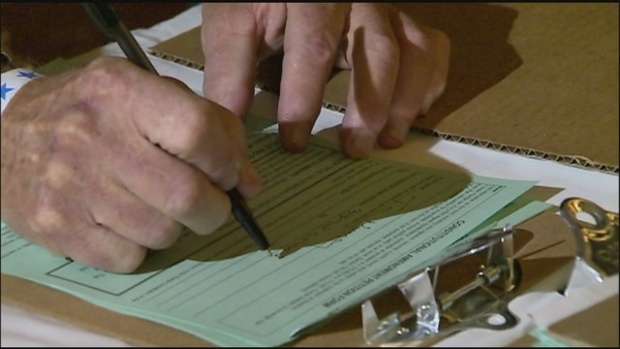Supporters of one of the many proposals vying to legalize marijuana in 2014 won approval from California Attorney General Kamala Harris to start gathering signatures. The decision was announced Dec. 24.
Backers of the Marijuana Control, Legalization and Revenue Act now must collect at least 504,760 signatures before their proposal can appear on the November 2014 ballot. The initiative would legalize “social” marijuana use, protect users from discrimination in the workplace, and prevent zoning bans, among other reforms.
 Americans for Policy Reform, the group behind the petition, is one of four organizations pushing legalization proposals in 2014. The deadline for collecting signatures is looming, and none of the petitioners have given themselves time to spare. The two ballot proposals most likely to succeed still don’t even have approval to start gathering signatures.
Americans for Policy Reform, the group behind the petition, is one of four organizations pushing legalization proposals in 2014. The deadline for collecting signatures is looming, and none of the petitioners have given themselves time to spare. The two ballot proposals most likely to succeed still don’t even have approval to start gathering signatures.
The odds are long for the other two, even if one makes it to the ballot. The protections afforded by the Marijuana Control, Legalization and Revenue Act only apply to users, with no limits for possession or cultivation. The other proposal, known as the Jack Herer act, would set cultivation limits of 99 plants per year and possession limits of 12 pounds per year.
The biggest complaint Californians have with medical marijuana is that there are no rules. Voters are in an increasingly friendly mood toward weed, but convincing them to approve a regulatory scheme with no regulations would be very difficult.
Of course, it’s possible voters will overlook those things in the thrill of reform, but unlikely. Opponents would have a field day portraying California as everything that’s wrong with legal weed and its backers.
Supporters of the Marijuana Control, Legalization and Revenue Act have other problems to worry about. A typo in their ballot application turned a clause saying people under 21 “shall” be barred from using weed into a clause saying they “may” be barred from using it.
The group may need Harris to re-approve their ballot “title summary,” the language voters read before deciding whether to sign a petition, and that could take a few weeks, said Dave Hodges, a dispensary owner in San Jose who works with Americans for Policy Reform.
“If we can get the funding we’re searching for, the signature gathering can be done in two to three weeks,” he said. “We’re still aiming for the 2014 election.”
Two other petitions are awaiting Harris’s approval. The Drug Policy Alliance is backing the Control, Tax and Regulate Marijuana Act of 2014, while the Cannabis Policy Reform Act was filed by activist Ed Rosenthal.
Both these petitions were filed late in the calendar, but the Drug Policy Alliance has access to substantial resources and, if it can get Harris’s OK, is considered more likely to make the ballot and succeed in 2014. Both these petitions are more realistic in their attempts to regulate marijuana.
In a financial analysis of the Marijuana Control, Legalization and Revenue Act proposal she cleared Dec. 24, Harris said the initiative would save the state “in the low hundreds of millions of dollars to state and local governments” in costs related to marijuana crimes, law enforcement and the justice system.
 California Marijuana Market Breaking "Marijuana News" from CA
California Marijuana Market Breaking "Marijuana News" from CA


